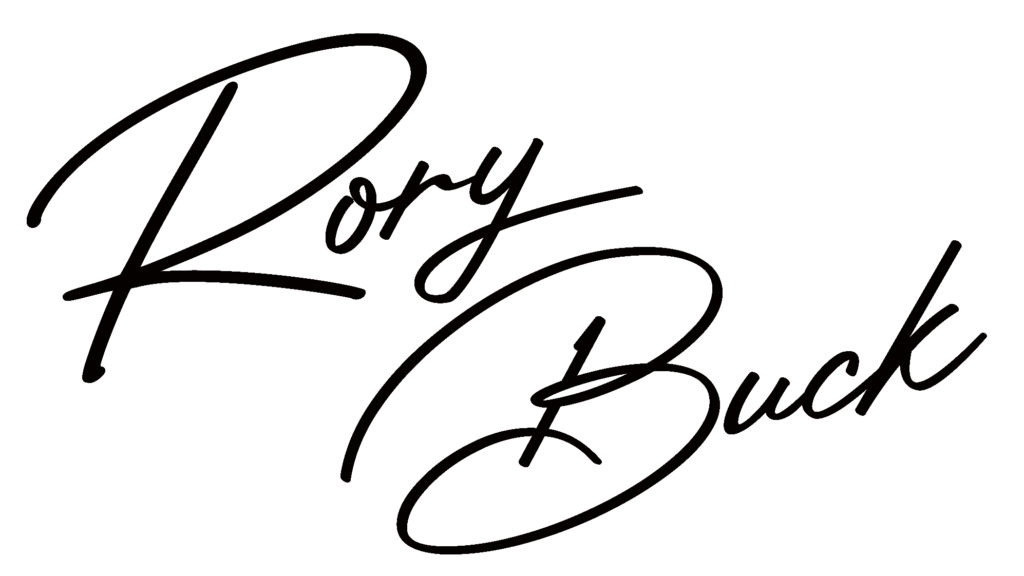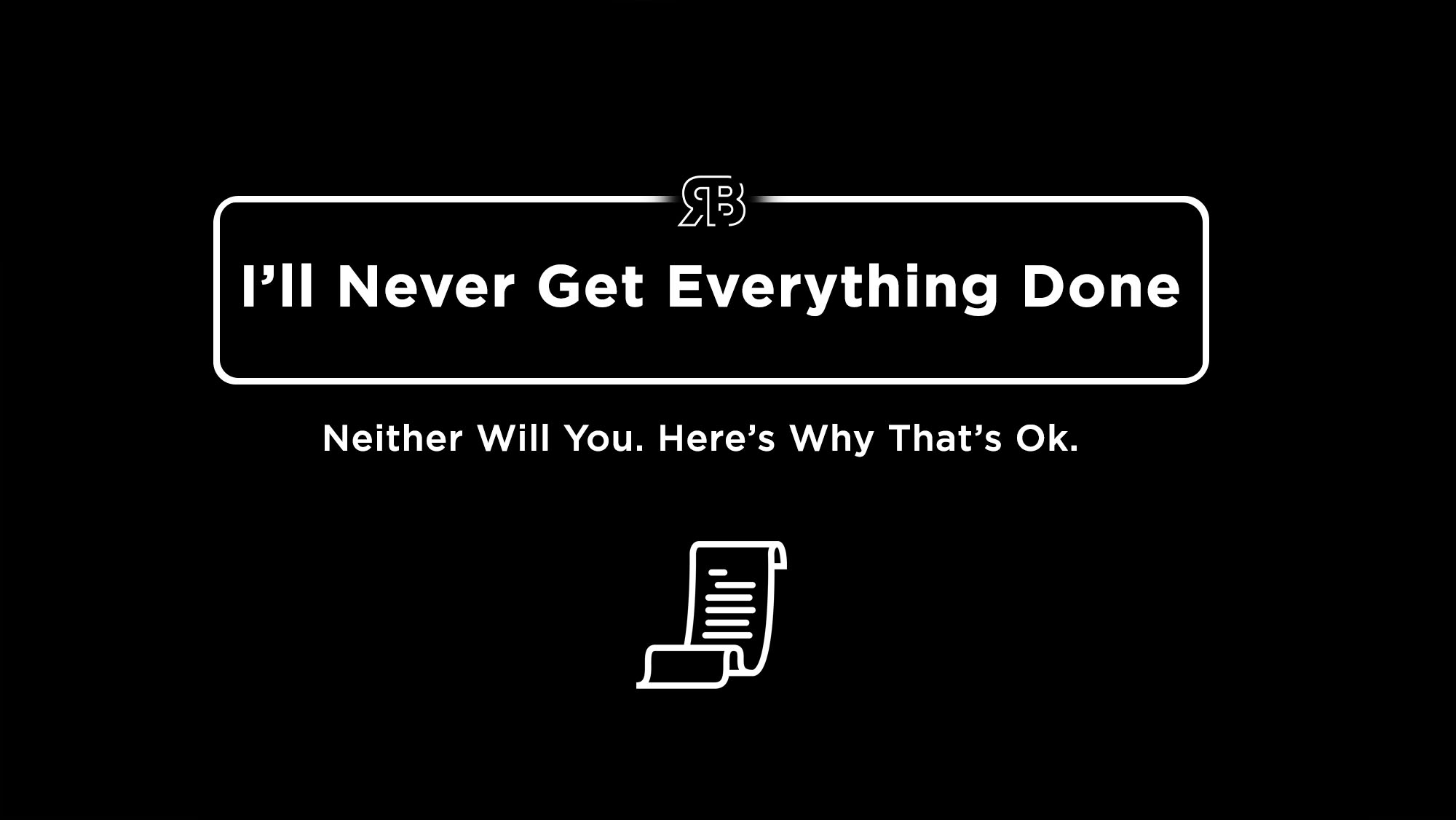I’ll Never Get Everything Done, Neither Will You. Here’s Why That’s Ok.
“Tomorrow” is a paradise. It’s the promised land.
It’s the place where only good things happen.
A place where productivity, success & contentment live.
The only place better than tomorrow is “Next Week”, “Next Month” or the mother of them all; “Some Day”.
Ah, “Some Day”. A mythical, undisclosed date in the future. Nestled deep in my imagination, with no limitations and no problems.
The “Some Day” in my mind definitely doesn’t have any limitations.
The lack of limitation that “Some Day” offers, sits in stark contrast to “Today”. The challenging reality I currently sit in.
The reality that I am a solopreneur & coach wanting to give 100% of my time and attention to each one of my athletes.
The reality that I am an endurance, multisport athlete. Which by definition requires time and attention to be split at least 3 ways. And the ability to do each for many hours at a time.
The reality that I am still a husband, a son, a brother, a friend, a dog dad, and an expat living in a country I call home, but is not my own.
The appeal of “Some Day” is that; none of those realities are competing with each other for my time or attention.
Because none of them are competing, I can give each my time, undivided attention and energy.
I know from experience that when I have time and something gets my undivided attention and energy, I can be pretty damn good at it!
And so, in the ideal paradise of “Some Day” I have time for everything that’s important to me. And I’m pretty damn good at all of it.
But today is not that day.
Although 3 weeks ago, when I was planning out all the things I’d get done in January, my brain thought it might be.
As I stare down the last few days of January, and close the first chapter of a new year, there’s the realization that I still have a lot of things I wanted to get done, but haven’t. And this has got me thinking, this week.
How many of us are able to fit everything in?
No one.
Not a single person.
I say that with confidence because in part, that question is rigged.
As a human living in the hyperlinked, fast paced 21st Century, there are too many options, too many opportunities, too many paths, too many choices, too many distractions for one person to do everything we are curious about.
Most can understand that, even if they don’t accept it.
Where you (and by you, I mean I) may start to feel uncomfortable is in accepting that there are actually too many options, opportunities, paths, and choices for us to be able to do everything we deem important, necessary or even critical in a given day, week or month.
The last 36 years have shown me that this is the case for me. I’d have done a lot more with life if I’d had more time (the irony).
The 6000+ hours of 1-1 coaching I’ve done for 100’s of clients over the last 10 years has suggested that it’s the case for most people. I’ve never met nor worked with anyone who’s been able to tick every box. Every time. And keep the streak alive day after day, week after week, month after month.
As Oliver Burkeman put it;
“The day will never arrive when you finally have everything under control—when the flood of emails has been contained; when your to-do lists have stopped getting longer; when you’re meeting all your obligations at work and in your home life; when nobody’s angry with you for missing a deadline or dropping the ball; and when the fully optimized person you’ve become can turn, at long last, to the things life is really supposed to be about. Let’s start by admitting defeat: none of this is ever going to happen.”
– Oliver Burkeman; Four Thousand Weeks
Ok, fine.
But, does that mean that no one is living a fulfilled life?
Are we all running around, unhappy, in the pursuit of a goal that is unattainable?
My observation is that the answer to that question is;
No. Not at all.
I know many people that are very happy and content. I’ve met and worked with many people over the years that feel fulfilled despite not having done it all.
Now, while I wouldn’t say I’m discontent or unhappy. I definitely have the (fairly) constant feeling that there’s more happiness or content on offer. So, I’m curious about how people are able to feel fulfilled despite not having done it all.
How can we fall short on all the things we could do, and yet still be content with all that we have done?
There are a few ideas and principles we can look to for answers, or at least to guide us in the right direction. I’ve written 4000+ words exploring it this week.
In amongst that writing, there are two things I keep coming back to, that I think are the right place to start:
We will all have a different list of what’s important to us. We have different ways of spending our time each day.
But few people have intentionally thought through the list of what’s important to them.
Even fewer have prioritized the list in a hierarchy that matches with their values and goals.
So, here’s what happens when we don’t have a clearly defined list with a clearly defined hierarchy of importance;
We end up with a TON of stuff on our plate.
And unlike the mythical “someday” everything on your plate is competing for your limited time.
It’s impossible to get everything done. So when we drop a ball; we’ll say “poor time management” or “lack of discipline to execute”.
Both are true to a degree.
But I’d argue that instead of “poor time management”, it would be more approriate to say it was a a lack of prioritization on what’s important.
And “lack of discipline to execute” is often exhaustion from too much stress.
If we can lay out a clear hierarchy of what’s important to us, we gain clarity and structure on how to approach each day, week or month with intention.
With a hierarchy of priorities, you can
– Focus your energy and attention on the things that matter most to you.
– With more focus you are empowered to achieve your goals in a shorter period of time
– Give you clarity and structure on how you allocate your time
– Manage expectations of people in your life in a proactive way, not a reactive way.
But most importantly in the context of contentment and happiness;
A hierarchy of priorities will allow grace & understanding when you “don’t have time” for something that falls lower on your priority list.
Prioritizing what’s important to you is not as easy as it sounds.
It takes an honest self audit and self awareness to know what your priorities actually are. It takes even more work to create the boundaries around them. The boundaries will ensure you’re spending your time on the things that matter most to you. To set those boundaries
You have to make choices.
You have to make trade offs.
You have to have hard conversations and accept responsibility for your decisions.
My wife, Carla and I met when we were 18 / 19. We didn’t get married until 8 years later.
That’s not because I was unsure I wanted to marry here. But because my Number 1 priority at the time was swimming.
I drew a very clear boundary around that priority of swimming.
I made the choice. I had to have many hard conversations about it.
I’m grateful that she was willing to stick around. So I didn’t have to deal with the potential consequences of my choices – but that is what priorities looked like to me.
The second idea I keep coming back to is surprisingly simple. And yet one of the most difficult things I’ve tried to act on.
The idea is best portrayed through a story:
Once at a party being thrown by a billionaire on Shelter Island, Kurt Vonnegut, the American author, turns to his friend, Joseph Heller, and tells him that their host, a hedge fund manager, had made more money in a single day than Heller had earned from his wildly popular novel Catch-22 over its whole history.
“How does that make you feel?” Vonnegut asks?
Heller responds,“Fine! I have something he will never have — enough”
Enough.
A hierarchy of priorities will define what you do with your time.
The word “enough”, will define how much is good enough.
To maximize the experience we get from our limited time we have to recognize that the incessant pursuit of more, bigger, better, stronger, shinier, faster is not the answer.
Being able to draw some sort of boundary around what is enough, is a good place to start.
When we understand what “enough” looks like, we gain the ability to express gratitude for what we have instead of fixating on what we don’t have.
When we can accept “enough”. We understand that having SOME time, alive, as a human being is better than having no time at all.
Appreciating the idea of “enough” is acknowledging that “more”, or the incessant desire for more, is not the path to happiness, it’s actually a path to discontentment.
Truly accepting this concept is very challenging to me.
If you’d explained this idea to me a few years ago, I would have disagreed with you.
I would have said accepting “enough” is settling.
It’s a sign you’re not motivated enough.
Not driven to improve.
I would have told you that no one who’s ever done anything of any significance has been happy to simply settle for what they have, without the drive for more.
And I think there is still validity in those beliefs.
But, as I mature I’m starting to see things the other side too.
I fell short on all the things I set out to do this January.
I accept that.
I’m also grateful for what I did get done. I know that what I completed was the highest priority for the month.
Accepting that I fell short, and being ok with it does not automatically close the door on what I could do in February, or March.
Moving into next month from a place of acceptance makes the journey into the future a far more enjoyable experience.
And that is how I end this month, content, without having done it all.
Have a good week.


